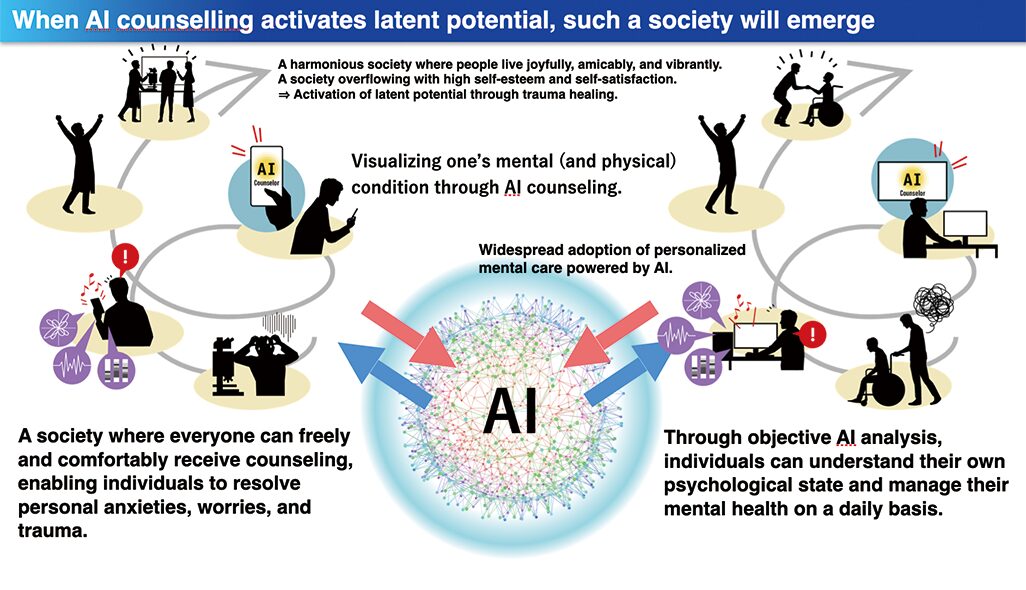Inochi Declaration
Utilize psychological approaches to heal trauma and unlock latent human potential—so that individuals may rediscover their inherent capacity and create innovation.
Researchers are tasked with generating innovation through discovery and invention. However, the greater the innovation, the less likely it is to arise through rational thought alone. Researchers typically take on challenges that cannot be solved by logic alone. If they begin by thinking: “There’s no way I could ever do this,” their drive to take on challenges diminishes. In contrast, when they deeply believe they can succeed, they are often able to tap into potential beyond their own imagination and accomplish extraordinary things. This principle holds true beyond research—in every field of human endeavor. When this power cannot be accessed, it is often because an individual’s mental resilience is weakened.

A society realized through AI counselling
How, then, can we strengthen our mental resilience? While it may be said that overcoming intense experiences or near-crises can build resilience, simply increasing external stress does not automatically lead to mental strength. This is where psychological approaches become essential. Trauma must first be addressed. For individuals carrying self-denying trauma—such as the belief that they lack ability—exposing them to extreme pressure can have the opposite effect and exacerbate their condition.
Trauma is often defined as “psychological shock” resulting from life-threatening experiences such as traffic accidents, violent crimes, or natural disasters. However, seemingly minor experiences such as being scolded or mocked in ev- eryday life can also result in trauma. This is especially true in childhood, when even small events can leave deep emotion- al wounds. Although parents may scold their children with good intentions, the children may interpret such actions as a denial of their very existence. As a result, they lose the ability to fully express the potential they inherently possess.
At The University of Osaka Resilience Support & Training Center, housed within the School and Graduate School of Engineering, individuals can receive trauma-focused counseling based on psychological approaches. Many faculty, staff, and students make use of these services. For example, a researcher who was generally well-adjusted but tended to give up when facing difficult problems came to the center for counseling. As a result, they were able to confront those challenges without hesitation. Similarly, students who had struggled to attend university because of trauma were able to overcome school refusal after engaging with counseling services at the center.
The impact of trauma-healing counseling can be summarized in two main effects:
1.Improved communication skills
2.A renewed sense of confidence
These outcomes raise self-esteem and enable individuals to express their latent abilities, thereby enhancing their capacity to generate innovation. In order to expand the use of such psychological approaches and reinvigorate society, it is essential to cultivate counselors with advanced skills.
To this end, The University of Osaka launched a project in FY2024 exploring whether counseling skills can be enhanced using AI and image-based diagnostics. The project begins with analyzing what constitutes advanced counseling techniques. This includes recording counseling sessions while simultaneously monitoring body temperature, heart rate, and brainwave activity to gather data for analyzing trauma healing processes. By using machine learning to study dialogue content, the project seeks to identify patterns and cues for trauma recovery—and possibly develop AI-based counseling methods. All of these measurements and AI capabilities are made possible by advances in semiconductor technology.
The Inochi Forum will collaborate in these kinds of projects and promote the use of psychological approaches to heal trauma and awaken latent potential—while also supporting advancements in semiconductor technologies.
[References]
・The University of Osaka, Faculty/Graduate School of Engineering – Resilience Support & Training Center
http://www.juf.eng.osaka-u.ac.jp/resilience/index.htm
・Activating Creativity through Psychological Approaches
https://www.eng.osaka-u.ac.jp/prospective/introduction-re-search/550/
[Action Platform]
Education and Children
[SDGs]


